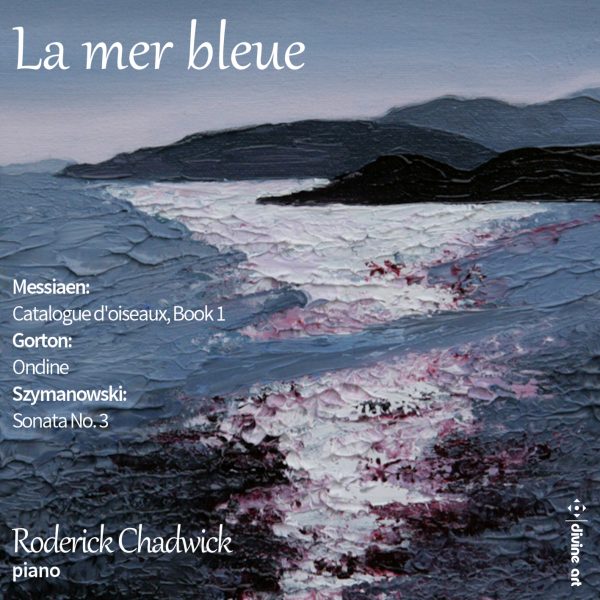Fanfare
Ensembles that include contemporary music specialist Roderick Chadwick in their ranks have been reviewed often in Fanfare. But this CD—titled La mer bleue—is his first solo recital to show up on these pages. And an impressive debut it is, one that plays to his considerable strengths, both technical and interpretive.
Pride of place goes to his performance of the three pieces that make up the First Book of Messiaen’s Catalogue d’oiseaux. As a whole, this two-and-a-half hour work incorporates the calls and describes the flights of over 70 different species. But the word “catalog” in the title is misleading: This is not a musical equivalent to the Peterson’s Guides that introduces the birds one by one. True, each of the 13 pieces in the full set settles on a particular French province. But while each is titled after what the composer called “the bird most typical of the region,” he’s written music in which “this typical bird is not alone: It is surrounded by its habitat neighbors” and, more significant, by “the surrounding landscape” (thus, for instance, in the first piece we get the “acrobatic flight of the chocards above the abyss”).
Beyond that, we get “the changing hours of day and night in this landscape, its colors, temperature, and the magic of its perfumes.” And, at a greater level of abstraction, the music reveals what Raymond Tuttle aptly called “Messiaen’s obsessive exploration of not just birdsong, but the wildness of Nature and God”. It’s often described as an extremely difficult piece for listeners not already steeped in Messiaen—but ever since I first met it through Yvonne Loriod’s touchstone Vega recording (the work was dedicated to her), I’ve found it irresistible. There are few works in the repertoire that have such a distinctive sound world—although unfortunately for most listeners, there are few works that benefit so much from having a score to follow, since the programmatic details, clearly spelled out on the page, are not easy for non-ornithologists to catch. Still, Messiaen’s music is so rich that even if you can’t distinguish the birds, the overall effect is dazzling.
My guess is that several reviews of Chadwick’s Catalogue will include some variation of the phrase “he wrote the book on it”—because, literally, he did: His Olivier Messiaen’s Catalogue d’oiseaux: From Conception to Performance was published by Cambridge University Press in 2017. His co-author, Peter Hill, had himself already recorded the work to tremendous acclaim—and now Chadwick follows suit. It’s an impressive performance, notable both for the paradoxically easy precision with which he charts out the most rapid-fire lines (try the duets of the Thekla lark) and for the sheer beauty of the less dynamic passages (say, the glorious ascension of the eagle in “Le chocard des Alpes” or the chorale-like passages that separate the cries of the garden warblers in “Le loriot” or, most striking of all, the evocative purity of the “blue sea” passages in “Le merle bleu”). Could Chadwick’s dynamic range sometimes be even wider? Are there a few spots where his line momentarily loses focus? Sure. But the only serious complaint about his Messiaen is that he has only given us a small portion of the complete work.
The Szymanowski is similarly impressive, Chadwick once again handling the cascades of notes with aplomb. This is a wide-ranging, post-Scriabinesque work that requires precision and succulence, ecstasy and introspection in equal measure. Chadwick doesn’t have the richest tone—but he’s got sharp architectural insight (absolutely necessary with a composer who can seem to ramble), building inexorably and offering a real sense of arrival at the climaxes. He’s also got a keen sense of the shifting character (or characters) of the music, patiently laying out the uneasy lassitude at the beginning of the Adagio with the same acuity with which he catches the dance undertow of the Assai vivace.
As for Ondine: David Gorton, a Birtwistle student, is best known for his avant-garde explorations of microtonality and extended instrumental techniques, sometimes involving electronics or radically reconsidered instruments (like the Howarth-Redgate oboe). Ondine is a relatively straightforward piece—although it’s surely meant to push its audience. About as static as the Messiaen is hyperkinetic, it focuses largely on sustained clouds of music with momentary Pointillistic sparkles, offering little clear direction in the traditional sense. Without a score or alternative performances, I can’t judge this reading—but given Chadwick’s expertise and his association with the composer, there’s little reason to doubt its quality.
One curiosity of the disc: there are brief interludes after the second and third Messiaen pieces, and a postlude after the Szymanowski, all played by violinists Peter Sheppard Skaerved and Shir Victoria Levy. No composer is listed—they might well be improvisations. In any case, they add little to the recital.
The notes are fine, although they tell us much less about the Gorton than about its companions, even though it’s the least familiar piece here. The sound is excellent. All in all, an impressive release.
@divineartrecordingsgroup
A First Inversion Company
Registered Office:
176-178 Pontefract Road, Cudworth, Barnsley S72 8BE
+44 1226 596703
Fort Worth, TX 76110
+1.682.233.4978












